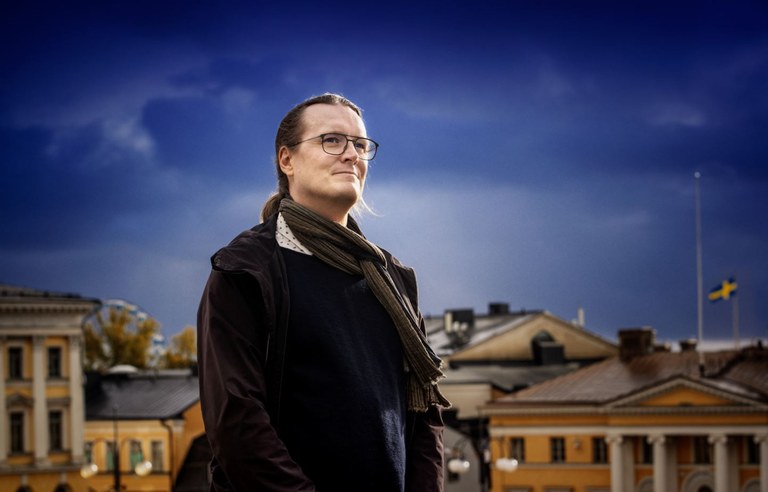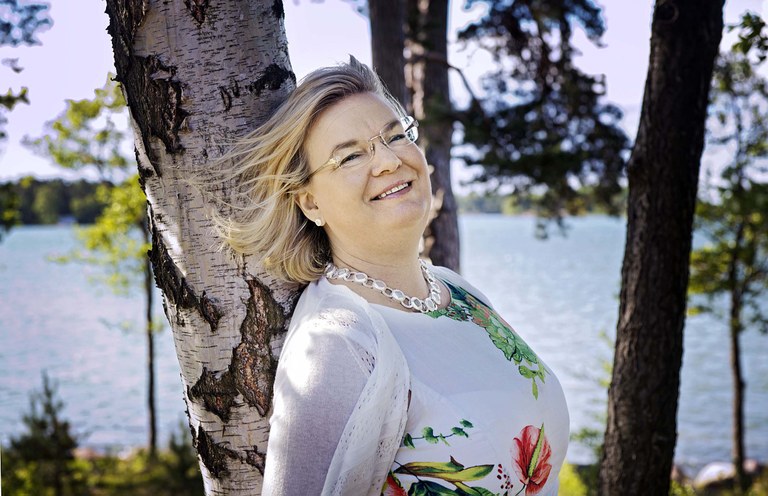Will English become the new Nordic language of cooperation?
Which language should the Nordic region choose for its future cooperation? The common Scandinavian which is spoken by three-quarters of the Nordic population? Or do we take the consequences of an ever decreasing understanding of languages and turn to English? Is the Nordic identity at all built on a common language?
English is the natural choice for young Nordic citizens in a globalised world, according to a new report from the Nordic Council of Ministers – “Does the Nordic language community exist?”
In Nordic cooperation, one of the three closely related languages Swedish, Norwegian or Danish, are used both in official work and with citizens organisations.
They can also be mixed into “blandinavian” or “SASperanto”.
For 60 years, the common Scandinavian language has been seen to increase cohesion across the barely visible borders in the Nordic region. Scandinavian has also been used a lot for cultural cooperation, and people have been encouraged to understand each other's Nordic languages.
After WWII, the Nordic region became a byword for international cooperation. But the interest for contacts with the rest of the world has increased after the founding of the Nordic cooperation organisations in the early 1950s, with NATO memberships, EU memberships and UN engagement.
Some Nordic organisations now use English as their working language, including the Nordic Investment Bank, Nordregio and organisations cooperating in innovation and energy research.
The Nordic Youth Nordic Council have aired the need of using English as a language in meetings. Many organisations complain of the high costs of simultaneous translation and time-consuming translations of documents from and to Finnish and Icelandic.
The private sector also uses English as a common language for cooperation and during mergers in the Nordic region.
Relax – English is democratic
One of the proponents of a more relaxed relationship to English in Nordic settings is Johan Strang, Associate Professor at the Centre for Nordic Studies at the University of Helsinki.

Strang recently addressed a webinar with Nordic Editors and Translators (NEaT). His role was to play devil’s advocate, and he underlined that he himself chooses to speak Scandinavian in Nordic settings.
Strang does not want the official Nordic cooperation on the Nordic Council and the Council of Ministers to switch to English. It is still better to keep it Scandinavian, and this is helped by the Nordic Council’s increased use of translations of Finnish and Icelandic and interpreters during committee meetings. Simultaneous translation has long been available for the two non-Scandinavian languages during meetings.
The idea of Nordic cohesion and cooperation is not only built on the common Scandinavian language, says Strang.
Speaking English in Nordic settings is often seen as more democratic and inclusive. It is a language that is nobody’s mother tongue, and so it is a democratic choice. That is the usual argument.
“Among the many languages spoken in the Nordics, only Swedish, Danish and the two Norwegian languages are understandable for others – at least in theory. This means that 20% of the population is not able to participate in the cooperation on equal terms,” according to Strang.
“Both Finns and Icelanders can feel like outsiders in a room where you are expected to speak Scandinavian. The same goes for Greenlanders and Sami, and also many immigrants.”
A Nordic characteristic or not?
What makes the Nordics Nordic, what makes us stand out? That is the question Johan Strang puts to all new students at the Nordic programme’s courses in Nordic politics, culture and history at the University of Helsinki.
Many mention the welfare state, the combination of individualism and the role of the state and high living costs, notes Strang.
The closeness to nature, the cold and the dark are also mentioned, along with blond citizens with Viking genes. The students also note the srtange combination of tolerance and nationalism – and also the equally strange combination of high levels of happiness and many suicides.
Strang has also heard students talk about the Nordic flags featuring crosses, Protestantism and Lutheranism. But there is also talk about secularisation and modernism – and functional architecture.
Strang is fascinated both by the answers and the phenomena. But equally fascinating is the fact that the language is hardly ever mentioned as a characteristic of the Nordics.
“This could be because in Finland we are a Finnish minority among Scandinavians. Or it could be that language is so obvious that nobody even mentions it. It does at least seem clear to the students that the Nordics have many things in common besides the language.
“We have already lost”
You do not need to choose either, according to Johan Strang. If we make this into a fight between Scandinavian or English, we have already lost. English is already the most important language in young people’s lives and in many people’s working lives, underlines Strang.

A fresh analysis from the Nordic Council of Ministers confirms that English is very popular among your people. 2,000 youths aged 16 to 25 across the Nordics answered questions about language skills and their views on language and culture.
The survey shows that young people’s understanding of other Nordic languages varies. In several countries, many think it is difficult to understand one or more Scandinavian languages.
The easiest Nordic language? English
A full 95% of young people in the Nordic countries said that English is easy to understand. 62% think Swedish and Norwegian is easy to understand. Only 26% say Danish is easy to understand. These answers represent a Nordic average which hides large national differences.
The survey shows that Norwegians think it is easy to understand both Swedes and Danes in most cases.
In Finland, Greenland and Iceland many young people do not feel the Scandinavian languages are easy to understand. Their languages Finnish, Sami and Greenlandic also belong to completely different language families.
So the Nordic language debate is off again. Focusing on languages has been a priority in Nordic cooperation since the beginning. There is no expressed change of course now either.
“Not happy reading”
Is the understanding between Nordic neighbours developing in the wrong direction, wondered Gunvor Kroman recently in a letter to the two daily newspapers Hufvudstadsbladet and Svenska Dagbladet, under the headline “Don’t capitulate to English dominance, promote the Nordics”.

Gunvor Kroman does not believe we in the Nordics should capitulate to English language dominance.
Kroman is the CEO of Hanaholmen, the Swedish-Finnish cultural centre just outside Helsinki. She has also worked at the Nordic Council secretariat in Copenhagen.
In the letter, she writes that the Nordic youth language survey was not happy reading for those who want to keep Scandinavian as a common language for Nordic cooperation.
Young people have a pragmatic attitude to language. Because it is important to make yourself understood, the majority of Finnish, Danish and Swedish youth would rather use English. If you want to make social contacts you can use Scandinavian, notes Kronman about the survey.
“English icebreaker”
Her experiences from Hanaholmen is that English might be needed in order to break the ice and establish contact on an equal basis in Nordic contexts.
Gunvor Kroman believes we in the Nordics should not capitulate to a dominant English language. Instead, we should promote Nordic cultural exchange, mobility and understanding of neighbouring languages.
That was also what the youth wanted. Two out of three young people said it is important for Nordic cohesion that the populations understand Swedish, Nordic or Danish.
The question is whether there is a need for some kind of equilibrium between Scandinavian and English in order for the Nordic language community to survive in the long run.
Kronman reminded people that it is our common language links that make it possible for young people to easily find work or to study in a different Nordic country. In this context, English language skills do not help all that much.
Language gaps and political indifference
Johan Strang is wondering why Denmark and Sweden are growing apart. Linguistically it could be explained by the fact that it is actually becoming increasingly difficult to understand Danish because its pronunciation is changing. But this is about more than languages.
“The real reason the gap between Denmark and Sweden is widening is probably that their interest in each other is falling.”
The Nordic region is no longer a central part of the political debate, which instead focuses on the USA and Europe. This is true for politics, culture and entertainment. Scandinavia is also growing apart mentally and linguistically.
The big challenge is to get Denmark and Sweden to speak to each other again, according to Johan Strang.
Maintain Finnish interest in the Nordics – also in English
The other challenge relates to Strang’s home county of Finland, with its two languages. These are not Finnish and English, as you might think by walking down a Finnish city street. The Nordic cooperation has become a political reason to keep Swedish strong in Finland. But the corporation cannot be maintained by the Swedish-speaking Finns alone. Finns also need to learn Swedish, argues Johan Strang. Swedish is today spoken by just over 5% of the population, and the constitution recognises both Finnish and Swedish as official languages.
If we want to have compassion for Swedish in Finland we should make sure interest in the Nordics remains high in Finnish Finland – even if it has to happen in English.
It is also an open secret why so many Nordic projects start with a seminar featuring foreign guests, according to Johan Strang. It means you can speak English, and that gets the Finnish onboard. Later, during coffee breaks or evening gatherings, you can try making yourself understood in Scandinavian again.
 Follow us on Facebook
Follow us on Facebook
